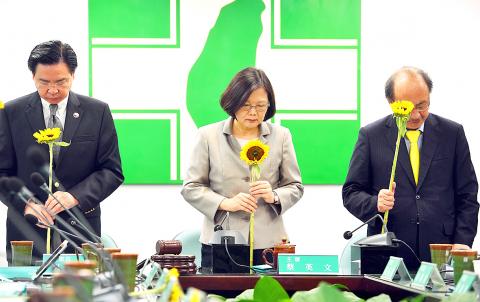Democratic Progressive Party (DPP) Chairperson Tsai Ing-wen (蔡英文) said that she would develop cross-strait ties according to the constitutional framework of the Republic of China (ROC) if she wins next year’s presidential election, the party said yesterday.
“Tsai has made it very clear that she will continue to push for peaceful and stable development across the Taiwan Strait based on public opinion and the fruits accumulated from cross-strait exchanges over the past two decades under the framework of the ROC constitutional system,” DPP spokesperson Cheng Yun-peng (鄭運鵬) said.
“We will make sure that Taiwan remains democratic and can make decisions on its own, and that cross-strait exchanges are democratic and transparent,” Cheng said.

Photo: Lo Pei-der, Taipei Times
Cheng made the remarks following criticism from China’s Taiwan Affairs Office spokesman Ma Xiaoguang (馬曉光), who said Tsai, in a speech at the Center for Strategic and International Studies (CSIS) during her US visit this month, failed to mention the “most important issue at the core” of cross-strait ties.
“Opposing Taiwanese independence and insisting on the [so-called] 1992 consensus are the basis of peaceful developments in cross-strait relations,” Ma told a press conference in Beijing earlier yesterday. “The core value is to agree that mainland China and Taiwan both belong to one China, and cross-strait relations are not nation-to-nation relations.”
“The DPP should clearly define what cross-strait relations are,” he added.
The “1992 consensus” refers to a tacit understanding between the Chinese Nationalist Party (KMT) and the Chinese Communist Party (CCP) that both Taiwan and China acknowledge there is “one China,” with each side having its own interpretation of what “China” means.
In 2006, then-KMT lawmaker Su Chi (蘇起) said that he created the term in 2000, when he was Mainland Affairs Council chairman.
Ma said that the “1992 consensus” should not be narrowly defined as a consensus accepted by the KMT and the CCP, and is not an “abstract concept or a historical term.”
“The term represents the basic attitude of both sides on the one China principle. It is because of this basic attitude that both sides are able to allow for differences while pursuing the same goals, as well as setting aside disputes to commence discussions,” Ma said.
Any changes to the core spirit of the “1992 consensus” removes any valid basis to the peaceful and stable development of cross-strait relations, Ma said, adding that the DPP must clearly respond and define what cross-strait relations are, on what basis such relations are carried out, and how peaceful and stable development should be maintained.
Ma also panned the US government and said its actions were not conducive toward the peaceful and stable development of ties across the strait.
The US should hold to the “one China” policy and their recognition of the principles behind the three communiques, Ma said, adding that “the US should not be sending the wrong signals to Taiwanese independence forces.”

ANOTHER EMERGES: The CWA yesterday said this year’s fourth storm of the typhoon season had formed in the South China Sea, but was not expected to affect Taiwan Tropical Storm Gaemi has intensified slightly as it heads toward Taiwan, where it is expected to affect the country in the coming days, the Central Weather Administration (CWA) said yesterday. As of 8am yesterday, the 120km-radius storm was 800km southeast of Oluanpi (鵝鑾鼻), Taiwan’s southernmost tip, moving at 9kph northwest, the agency said. A sea warning for Gaemi could be issued tonight at the earliest, it said, adding that the storm is projected to be closest to Taiwan on Wednesday or Thursday. Gaemi’s potential effect on Taiwan remains unclear, as that would depend on its direction, radius and intensity, forecasters said. Former Weather Forecast

As COVID-19 cases in Japan have been increasing for 10 consecutive weeks, people should get vaccinated before visiting the nation, the Centers for Disease Control (CDC) said. The centers reported 773 hospitalizations and 124 deaths related to COVID-19 in Taiwan last week. CDC Epidemic Intelligence Center Director Guo Hung-wei (郭宏偉) on Tuesday said the number of weekly COVID-19 cases reported in Japan has been increasing since mid-May and surpassed 55,000 cases from July 8 to July 14. The average number of COVID-19 patients at Japan’s healthcare facilities that week was also 1.39 times that of the week before and KP.3 is the dominant

The Chinese Communist Party’s (CCP) working group for Taiwan-related policies is likely to be upgraded to a committee-level body, a report commissioned by the Mainland Affairs Council (MAC) said. As Chinese President Xi Jinping (習近平) is increasingly likely to upgrade the CCP’s Central Leading Group for Taiwan Affairs, Taiwanese authorities should prepare by researching Xi and the CCP, the report said. At the third plenary session of the 20th Central Committee of the CCP, which ended on Thursday last week, the party set a target of 2029 for the completion of some tasks, meaning that Xi is likely preparing to

US-CHINA TRADE DISPUTE: Despite Beijing’s offer of preferential treatment, the lure of China has dimmed as Taiwanese and international investors move out Japan and the US have become the favored destinations for Taiwanese graduates as China’s attraction has waned over the years, the Ministry of Labor said. According to the ministry’s latest income and employment advisory published this month, 3,215 Taiwanese university graduates from the class of 2020 went to Japan, surpassing for the first time the 2,881 graduates who went to China. A total of 2,300 graduates from the class of 2021 went to the US, compared with the 2,262 who went to China, the document showed. The trend continued for the class of 2023, of whom 1,460 went to Japan, 1,334 went to